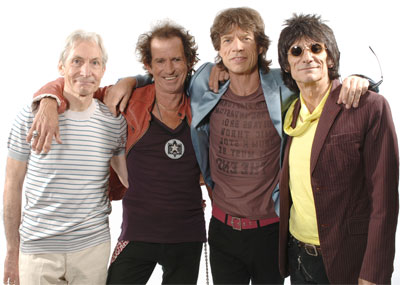Wednesday, May 18, 2005

Still here!
May 17, 2005
Who among the teenyboppers shrieking for the Rolling Stones during their first American tour in June 1964 could have possibly imagined that some of their grandchildren would be shrieking for the Stones with the same levels of delirium in 2005, more than 40 years later?
Mick Jagger's mug may have the look of a petrified fielder's mitt, but 25-year-old Laurin Mack of Middleburg, Va., still thinks he's the sexiest man on the planet. "I realize he's as old as my dad," she said, "but it's like a chemical reaction. He was probably born sexy."
When the Stones first came to the states (four months after the Beatles), the Watusi and the monkey were big dances, Barry Goldwater embodied the hopes of the Republican Party, and John Kennedy had been dead less than a year. Bill Clinton and George W. Bush were both 17.
"It was the first time we went to Omaha that I really understood how heavy it could get," said Keith Richards in an oral history compiled by the Canadian writer Alan Lysaght. "We were just sitting around drinking whiskey and Coke out of little cups before we went on and the cops walked in and said, 'What's in that cup?"'
Richards replied, "Whiskey, sir." A cop said, "You can't drink that here; it's a public place. Throw it down the drain." Richards said, "No."
When he looked up, Richards recalled, a loaded pistol was pointed at his head.
Three of the current Stones were on that tour ? Jagger and Richards, who are now 61, and Charlie Watts, who will be 64 in two and a half weeks. Joking about their ages has proved irresistible.
The Daily News came up with titles for new songs they might consider playing on their upcoming tour, including "(I Can't Get No) Metamucil" and "Let's Take a Nap Together."
A young New York Times employee was astonished to learn that Richards is old enough to have been evacuated with his family during the bombing of London by the Nazis in World War II.
You could get a ticket to a Stones concert in 1964 for $2 or $3. They didn't have a huge hit record and were pretty widely viewed as a rowdy, unkempt imitation of the Beatles. Forget 2005 (and its top ticket price of $453). They seemed unlikely to survive until 1965.
But while no one would have guessed that the Stones were 21st-century bound, the essential ingredients for their longevity were already in place. They were decent musicians and they put on a great show. The main attraction was Jagger's manic magnetism. Short, skinny and 21, he was a cross between a rooster and a lightning bolt.
The Stones were fun.
The whole key to the Stones was that they were masters of make-believe. They played at being blues musicians.
They gleefully marketed themselves as the outrageous, anarchic alternative to the Beatles, when in fact, as Richards noted in the oral history, the Beatles "were the same kind of blokes as us."
Now, in the latest of their incarnations, they are charming, aged delinquents playing their former selves.
The Stones really did love the blues, and they promoted the old blues masters. But the Stones' own music was a different story. They took the blues and wrung out the grief and sadness until all that was left in most cases was the fun. (My father would have said they took out all the vitamins.)
When the Stones, in "The Last Time," sang, "It's too much pain and too much sorrow," they sounded like the happiest guys in the world. "(I Can't Get No) Satisfaction" sounds like the temporary disappointment of a frat boy on an off night.
While entertaining, those kinds of pieces are a long way from the sound and feel of Robert Johnson singing, "Li'l girl, my life seem so misery," or Muddy Waters begging, "Baby, please don't go."
The Stones learned enough from the blues to lift their best work above the level of the rock 'n' roll mainstream, and the rest was pretty much unadulterated fun. It's been working for them for more than 40 years.
"You don't find bands like that anymore," said Brendan Burke, a 22-year-old Stones fan who graduated last year from New York University. Their age, he said, doesn't bother him at all.
On a hunch, I asked him what he thought of as the age when people started getting old.
"Forty," he said. There was silence on the telephone. Brendan hung in there. "Forty or 45," he said.
Bob Herbert is a New York Times columnist
